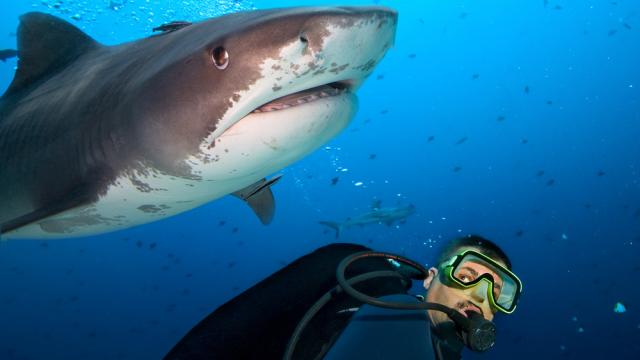Shark netting strung up in coastal waters to protect swimmers from the ocean’s apex predators has not worked nearly as well as we had hoped. But where these knotted nylon lines have failed, one Australian company hopes an electric field will succeed.
For more than half a century, bathers and swimmers in the KwaZulu-Natal region along South Africa’s eastern coast have relied on stretches of netting to keep sharks at bay — unfortunately, these nets often strangle the very sharks they were meant to deter and post similar threats to any other marine animal to venture too closely. But that’s where a prototype system, dubbed the Shark POD, comes in.
Remember the Shark Shield from a few years back? These ankle-and surfboard-mounted devices emit a low level electrical impulse that deters sharks by wreaking havoc with their ampullae of Lorenzini (the gell-filled organ in shark noses that allows them to detect the minute electrical impulses generated by their prey’s nervous system). The genius of these devices was that they only affected sharks and rays and only very slightly.
A 2012 study off the coast of South Africa, where the world’s densest population of White Sharks congregate, found that the POD “significantly increased the mean minimum distance between the shark and the EFS [electric field source]” without causing any lasting harm or even discomfort to the animal. It didn’t necessarily prevent sharks from taking the experiment’s bait, but it did reduce the number of approaches by sharks and greatly increased the amount of time it took for them to eventually strike.
Now, that same technology is being scaled up to protect entire beaches — not just individual divers. The system is assembled by simply stringing a 100m cable between a series of risers affixed to the seabed and turning it on. A team from the KwaZulu-Natal Sharks Board (KZNSB) have begun installing one just off Glencairn beach where it will remain for until next April.
“If successful, it will provide the basis to develop a barrier system that can protect bathers without killing or harming sharks or any other marine animals,” the KwaZulu-Natal Sharks Board told the AFP. That includes humans too — even grabbing a handful of the electrified cable won’t produce more than a mild tingling sensation. Same goes for cetaceans like dolphins and whales.
It’s “a really good idea” Alison Kock, a biological scientist and research manager for Shark Spotters in Cape Town told the AFP. “It’s an exciting opportunity to look at new technology with the ultimate aim of replacing lethal control methods like shark nets and (baited) drum lines.” [Shark Shield via Physorg – North Glenn News – NIH – SARDI – KZNSB]
Picture: frantisekhojdysz
